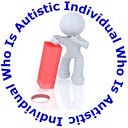7 Things I Wish I Knew in My Early Autistic Revelations
More wisdom is welcome in the comments!
I was diagnosed with level 2 autism around three years ago, at the ripe age of 37 years old. The adverse aspects of being autistic — specifically extreme sensory issues, markedly increased difficulty communicating, and terrifying meltdowns — had left me desperate for answers, so going through the self-diagnosis process, learning what autism actually is, getting info from autist-led organizations, and connecting with other autistic people was a savior. I’d felt far from normal my whole life and hadn’t even been able to pretend it for years, so it made me feel like I wasn’t a lunatic-alien-person…I was just autistic!
It had a name. A name that comes with a community that speaks my language, understands the life-ruling struggles others had labeled with words like ‘bizarre,’ and has advice for how to deal with it all. Though I fully recognize the validity of self-diagnosis, I needed a formal diagnosis to help quell the all-too-loud naysayers in my mind, echoes from decades of people trying to convince me I was just lazy, dazy, or crazy. And it did.
But after a year or so of elation, I started to realize that knowing the reason for these struggles wasn’t necessarily helping me cope with them, and that I had some pretty unreasonable…

